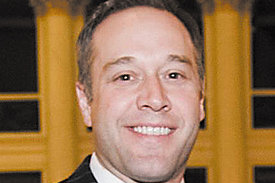Central PA Republican comes out Rep. Mike Fleck (81st Dist.) came out late this year — making both local and national history as the first openly gay Republican state lawmaker ever. The announcement came weeks before the inauguration of Rep.-elect Brian Sims, the first successful out candidate for state legislature in Pennsylvania. Fleck made the announcement in an interview with Huntingdon County’s The Daily News. Fleck, 39, told the newspaper that he had been struggling with his sexuality for years and separated from his wife of nine years in 2011 and decided to publicly come out after the election. Fleck said he will remain a Republican and a person of faith, but “the only difference now is that I will also be doing so as honestly as I know how.” Fleck, who has worked with Pennsylvania Student Equality Coalition on an LGBT-inclusive anti-bullying measure, has yet to vote on any LGBT-specific bills and is considered a moderate Republican.
Hershey pays out to student with HIV A Philadelphia boy and his family won a federal lawsuit this year against a boarding school that rejected the student’s application for admission because he is HIV-positive. The AIDS Law Project of Pennsylvania filed suit last December against the Milton Hershey School, in Central Pennsylvania, on behalf of the 13-year-old. The school, which educates disadvantaged youth, said it could not “accommodate the needs of students with chronic, communicable disease that pose a direct threat to the health and safety of others.” In September, the school agreed to settle the suit and will pay the boy and his family $700,000 — $600,000 of which will go in a trust fund for the student and $100,000 of which will go to his mother. The school will pay an additional $15,000 in penalties assessed by the U.S. Department of Justice. Before the settlement, the school issued an apology and instituted a nondiscrimination policy inclusive of HIV status. As part of the settlement, the student was barred from reapplying to the school.
Backlash, confusion amid voter-ID law Pennsylvania’s new voter-ID law was debated nearly up until Election Day. In the spring, Gov. Tom Corbett signed a tough voter-ID bill into law, which would require anyone who wanted to vote to present government-issued identification, an initiative spurred by Republicans. Republicans defended the law as a means to prevent voter fraud, but Democrats criticized the measure as a way to keep populations that trend toward the Democratic Party from voting in the election. Critics said the law could disenfranchise minorities, the elderly and low-income voters, as well as transgender and gender non-conforming communities. A transgender Pittsburgh man was one of several plaintiffs who sued the state over the issue, leading to an October ruling blocking the law’s implementation, but leaving it open for the future. During the course of the trial, a representative of the Department of Transportation announced that the state would drop gender markers from the new voter-ID cards, offered for voters without proper ID. The move was thought to be the first time the state would issue an identification card without a gender marker.
Ravi sentenced, released in Clementi case Dharun Ravi, the Rutgers University student accused of cyberbullying his roommate Tyler Clementi in 2010 — which may have led to Clementi’s suicide — served less than a month in prison this past spring. A jury in March found Ravi guilty of invasion of and attempted invasion of privacy and several counts of bias intimidation, but acquitted him on most of the bias charges. He could have faced up to 10 years in prison but a judge instead sentenced him to 30 days. Ravi reported to the Middlesex County Department of Corrections May 31 and was released 20 days later, due to credit for good behavior and for working. In September 2010, Ravi spied on roommate Clementi in an intimate encounter with another man and invited others to watch the feed. Days later, he attempted to again spy on his roommate. Shortly after Clementi found out about the invasion of privacy, he committed suicide. Ravi was also ordered to pay $10,000 in probation fees, participate in diversity and anti-bullying training and complete 300 community-service hours.
NJ goes for marriage Marriage equality was a fleeting reality in New Jersey this year. In February, for the first time ever, both chambers of the New Jersey legislature approved a bill to legalize same-sex marriage. Within a day, however, Gov. Chris Christie vetoed the measure. In the previous session, the Senate rejected a marriage-equality bill, and it had never made it to the floor of the Assembly. Christie issued a conditional veto, saying he would prefer voters to decide the issue. Senate President Stephen Sweeney said Christie “firmly planted his feet on the wrong side of history.” Supporters have until January 2014 to override Christie’s veto by garnering two-thirds support — meaning three new Senate votes and 12 new Assembly votes. A lawsuit calling for marriage equality remains pending in the New Jersey courts. In December, Assemblyman Reed Gusciora, the out prime sponsor of the marriage-equality bill, introduced a measure to authorize voters to decide the issue. While he said he is against the concept of civil rights being voted on, he contended that a voter referendum is proponents’ best shot at achieving marriage equality in the near future.
